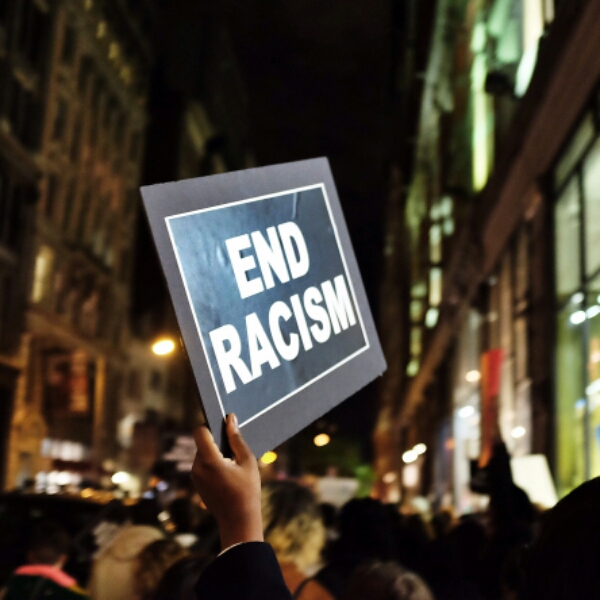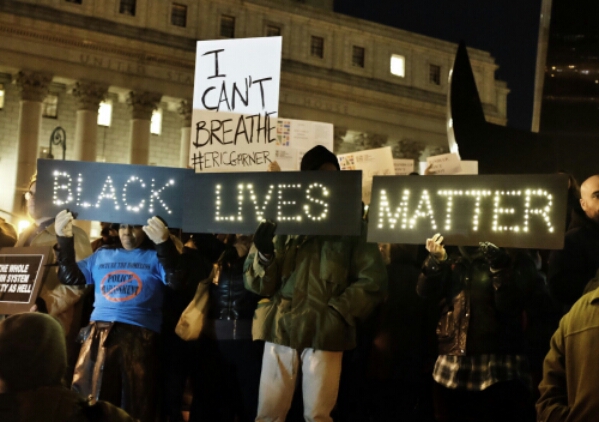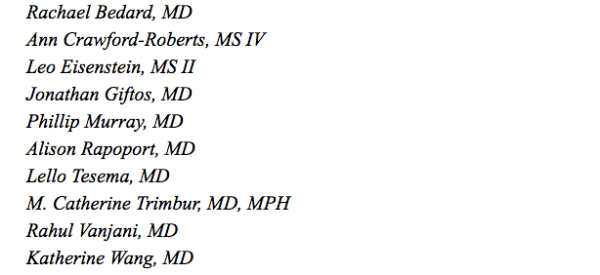Update 7/13/2016 4:52PM—almost 1,400 have signed on to this platform!
Almost a dozen physicians, some who have worked in The Bronx, have penned an open letter to their patients on racism and their commitment to them following the aftermath of last week’s killing of Alton Sterling, Philando Castile, and Delrawn Small.
Jonathan Giftos, MD, who is one of the lead authors of the letter wrote, “Moved by the tragic shootings this past week, and informed by years of clinical practice, a group of us came together and drafted the following response from the physician community (which has for too long been silent on the issue of systemic racism) in the form of a letter of commitment to our patients. In just one day the letter has been signed by over 750 people including department chairs, deans of medical education, surgeons, OBGYNs, primary care docs and psychiatrists. Please read our letter and share widely. Thank you. “
A Letter to Our Patients on Racism

We are doctors and medical students who witnessed the events of the week of July 4th, 2016 with horror and grief. The murders of Alton Sterling in Baton Rouge, Louisiana, Philando Castile in St. Paul, Minnesota and Delrawn Small in Brooklyn, New York reiterated a lesson that we should not have to keep learning: that black and brown people in the United States are at risk of police violence unlike any other group of people. There is a long tradition of physician-activists who have devoted their careers to working for racial justice. Yet historically, physicians as a group have not yet taken adequate responsibility for confronting racism, in our work or outside of it. We write to you now, late in making these promises, to make explicit the following five commitments:
1. We commit to support Black Lives Matter.
We write to express our solidarity with activists around the country who are working to protect and promote the dignity, well-being and equality of black people. We stand with Black Lives Matter in protests and affirm BLM’s commitments to restorative justice and respect for life. We hear in the clarion call for empathy and loving engagement the values that inspire us to care for patients. Following the lead of medical students who have organized themselves to form White Coats 4 Black Lives, we stand with friends and colleagues who organize to fight racial injustice.
2. We commit to dismantling the structural racism embedded in the healthcare system.
We aim to do so through learning, collaboration, activism, advocacy and leadership. We know from well-established research and fromexperiences in clinical practice that our healthcare system treats people of color differently from how it treatswhite people. Black and brown patients have less access to healthcare, endure more discrimination in healthcare settingsand suffer worse health outcomesthan white patients. This begins with our medical system’s failure to recruit and retain a diverse and representative physician workforce, continues with a white-centered curriculum and culture in our medical schools, is made manifest in unequal treatment of patients on the wards and in the clinics, and is perpetuated by research that hasexploited, pathologized and excludedblack and brown people. We commit to recognize our own conscious andunconscious biases, to be honest about the systems and teams in which we work, and to call out what we see. We promise to recognize our potential to lead and to work for change.

3. We commit to learn how to provide trauma-informed care, and to teach this approach to our students, trainees, and fellow providers.
Traumatic experiences linked to community violence, segregation, concentrated poverty and discrimination negatively impact our patients’ health. We commit to partnering with our patients to address the pervasive stress associated with surviving in an unjust world, to recognize signs of trauma in our patients, to respond to trauma in our treatment plans and toavoid retraumatizing those we seek to serve. We will recognize and learn from the strength and resilience of the communities we care for. We will learn to support individual paths to healing. We will strive to practice with transparency in order to promote trust. We will seek to empower rather than patronize and diminish. We commit to practice with deep respect and love.
4. We commit to healing communities ravaged by discriminatory criminal justice practices through engaging public health systems.
We will confront discriminatory practices in the criminal justice system by measuring the questions that matter. These might include but are not limited to: monitoring trendsin police violence; assessing theimpact of mass incarceration on communities of color; and supporting evidence-based public health approaches to community violence. We will explore how local public health systems can convene diverse stakeholders in education, healthcare, law enforcement and faith-based organizations to facilitatetruth and reconciliation forums in communities devastated by structural violence. We commit to models of community-based participatory research in which our patients serve as partners in our inquiries. We will support evidence-based policies that leverage the lessons from this research and we will lobby legislators to prioritize programs that promote racial justice.

5. We commit to using our power as constituents and leaders to insist that every major medical society and association develop a policy on racial justice.
A policy on racial justice is a starting point; we will also hold these organizations accountable to their statements and leverage their influence to elect political leadership that represents our concerns. We will use the powerful organizations that are meant to represent us as physicians to demand change locally and nationally.
Much of what we promise to do in this letter is informed by the work of our activist colleagues and forebears, and some will require we make a new road by walking. We feel an urgency to set these intentions as a step along the path to change, recognizing there are many more steps for us all to take. We see the killing of black and brown people by police as just the edge of the knife; it is the sharpest, most acute consequence of a systemic racism that devalues black and brown lives. We cannot allow it to persist. With humility we make these commitments today to you, our patients, and to the possibility for a more just world.
In solidarity,


You must be logged in to post a comment.